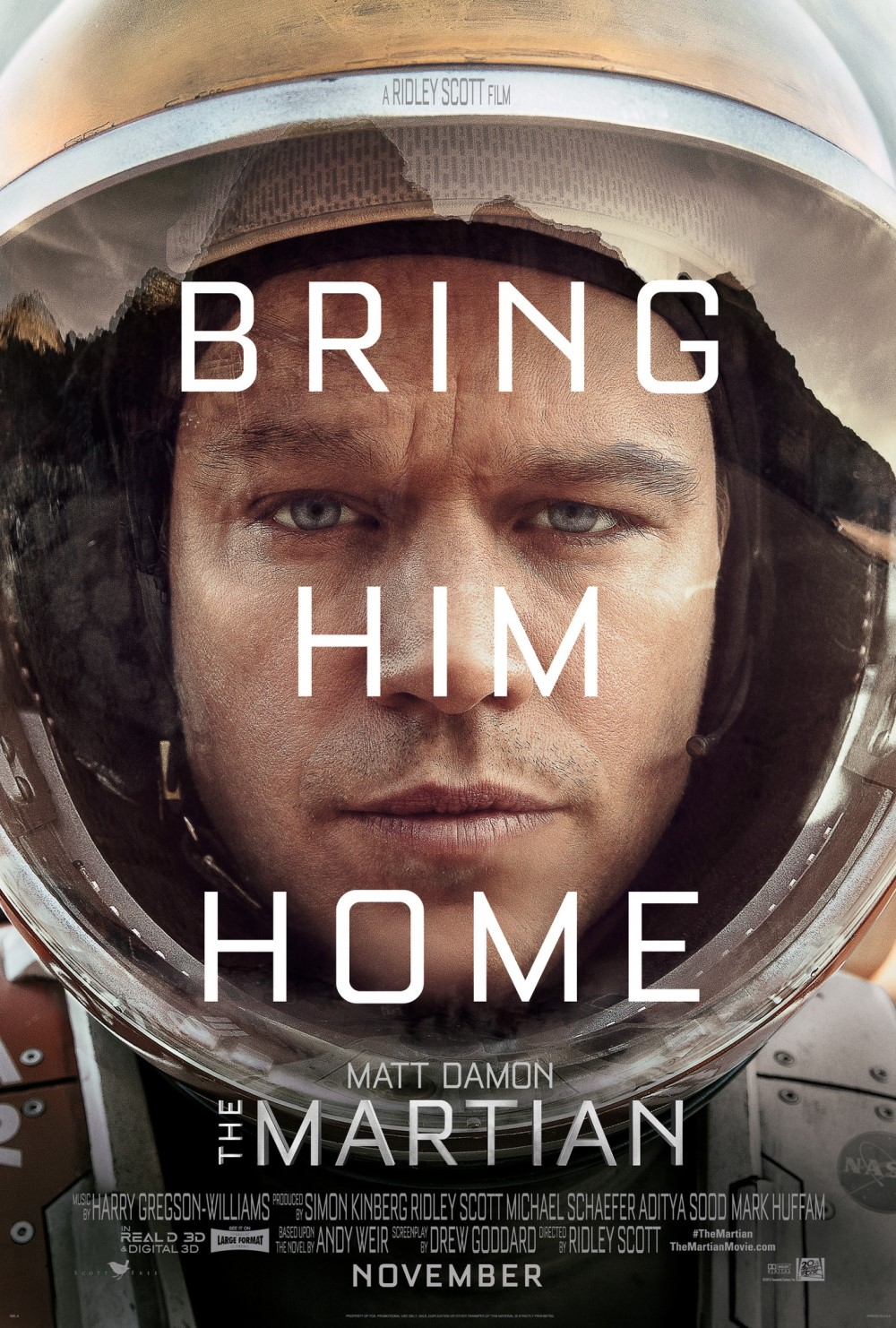Ska /skä/ (noun) – A style of fast popular music having a strong offbeat and originating in Jamaica in the 1960s, a forerunner of reggae.
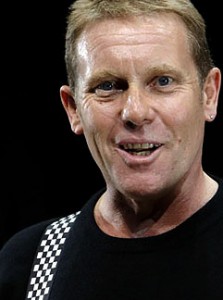 If you’ve ever listened to music by the likes of the Mighty Mighty Bosstones, Madness, Fishbone or The Specials – as well as bands that infuse elements of ska into their music like No Doubt and Reel Big Fish – you know that the genre’s intense energy makes it almost impossible not to get out of your seat and start to move your feet to the rockinest, rock-steady rhythm around. The Beat – known in the US as The English Beat – was one of the bands at the forefront of ska’s second revival (or “wave”) and one of its best. With hits like “Save it for Later” and “Mirror in the Bathroom”, the English Beat had the ability to propel audience members into a skankin’ dance frenzy.
If you’ve ever listened to music by the likes of the Mighty Mighty Bosstones, Madness, Fishbone or The Specials – as well as bands that infuse elements of ska into their music like No Doubt and Reel Big Fish – you know that the genre’s intense energy makes it almost impossible not to get out of your seat and start to move your feet to the rockinest, rock-steady rhythm around. The Beat – known in the US as The English Beat – was one of the bands at the forefront of ska’s second revival (or “wave”) and one of its best. With hits like “Save it for Later” and “Mirror in the Bathroom”, the English Beat had the ability to propel audience members into a skankin’ dance frenzy.
And they still do.
Dave Wakeling, the lead singer and guitarist of the English Beat, and the entourage of musicians that round out the current iteration of the band extensively tour the United States and feed audiences a steady dose of high-energy music that often manages to weave in politically-astute and cutting lyrics. The crowd sweats, the band sweats and, by night’s end, both are all the better for it.
I recently had the opportunity to chat with Dave about the driving force that powers the English Beat’s seemingly non-stop touring, a great soundtrack album that never happened, how a cup of kindness can occasionally have a very bitter taste and why he might cause quite a ruckus when visiting the Rock and Roll Hall of Fame in Cleveland.
Dave Picton: The English Beat tours VERY extensively. How do you maintain such a rigorous schedule given that your shows are intensely energetic?
Dave Wakeling: Well, we’ve got a decent balance. Every other month we go on tour for about three weeks and we do about 15 or 17 shows in 21 days. The other five weeks we’re here at home and we just work Fridays and Saturdays in California normally driving up and down the coast depending. That way, although we’re doing an enormous amount of work, we’re all getting time off in those weeks so it all works out very well. We never stay on the road 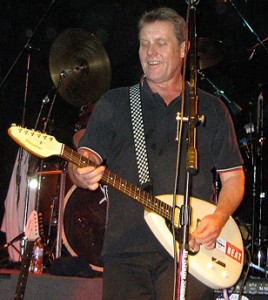 more than three weeks because you start scraping the barrel. It’s always nice to be able to have fresh real emotions to do the songs. We can do our memory muscle emotion but it’s not the same. It doesn’t connect as well. It’s kind of dissatisfying. But if I do a show right under the right circumstances, I feel fresher at the end of the show than I did at the start. So it’s sort of nurturing to me at this point.
more than three weeks because you start scraping the barrel. It’s always nice to be able to have fresh real emotions to do the songs. We can do our memory muscle emotion but it’s not the same. It doesn’t connect as well. It’s kind of dissatisfying. But if I do a show right under the right circumstances, I feel fresher at the end of the show than I did at the start. So it’s sort of nurturing to me at this point.
DP: I went to one of your shows about a year ago and it was the first time I had seen you guys. It was certainly the most fun I’ve ever had at a concert.
DW: Thanks! Where was it?
DP: In Fairfield, Connecticut at FTC’s Stage One.
DW: Right, the train spot.
DP: Yep, that’s the one. Everyone in the crowd danced throughout the entire show and I’d never really seen that happen before to that level of intensity, but I’m guessing that’s something you’re quite accustomed to.
DW: You know, sometimes people are surprised the first time we get to a venue and they’re not expecting it. Now, at Fairfield, we’ve been a good few times and people come with an anxious anticipation of having a good dance, I think. It’s all the more benefit, Dave, I think because times are times are really tight. Our social lives and our work lives particularly can be quite tense and the world, at least according to the TV news, is a scary place. So it’s nice to be able to go someplace with a peer group and throw all caution to the wind and feel at one with yourself and your memories and everybody else in the room. It’s a rare occasion and the people tell us that they’re really grateful of it and that it can see them through until the next Wednesday.
DP: That certainly was the case for me. In fact, the show spawned probably the most justified concert t-shirt purchase I’ve ever made because, by the end of your first set, I was absolutely drenched with sweat. So I bought the shirt, went into the bathroom and changed out of my wet towel of a shirt in favor of my newly-bought English Beat shirt. Sure enough, by the end of the show, that one was drenched too.
DW: Ah yes! Bless your heart. That’s the ticket. I end up soaking wet at the end 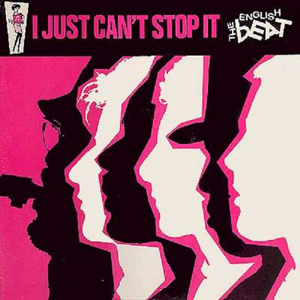 of the shows too, but I don’t really notice it, even though you might start to get tired heading into the second hour of the show after about the one-hour mark. After about an hour and fifteen minutes, you’re back up there again with the energy from the audience. So it’s kind of like what the band does in the first half, the audience holds us back up with in the second half.
of the shows too, but I don’t really notice it, even though you might start to get tired heading into the second hour of the show after about the one-hour mark. After about an hour and fifteen minutes, you’re back up there again with the energy from the audience. So it’s kind of like what the band does in the first half, the audience holds us back up with in the second half.
DP: I’m curious to know about how the band came together in 1978.
DW: What was most remarkable about it that it was the first person we met played a particular instrument ended up playing that instrument in the band. There weren’t any auditions or “what about this guy” or “what about that guy” and so it was very much like what you might see in a movie script about putting a band together. Everything all came together so wonderfully easy that, right at the beginning, you had a sense that it wasn’t going to last for very long. [laughs] It had a certain magical charm to it that this group of people were put together for a certain purpose. And it turned out that it was, you know. We managed to combine dance music with a gentle social commentary or a subtle gentle prodding. So we wanted to combine both types of prodding, the sexual and the social. [laughs] And it worked perfectly. Even now, I’m getting messages from people at Occupy Wall Street saying that the Beat album is being played, that the songs “Big Shot” and “Stand Down Margaret” are deemed particularly appropriate for the times. One of the huge benefits is that if you’re lucky enough to get a chance to be in the moment fully, then it never really goes away. Once you’ve made that connection – even though sometimes the waves of ska take seven years in between high tides – it always flows back and all of a sudden lyrics become pertinent again.
DP: Any chance you’d put together some new material and release a new studio album that might include songs in which the lyrics deal with current issues and socio-political topics?
DW: We’re in the process of doing that now, actually. I’ve got just over 20 songs started and some of them are my favorite songs that I’ve ever done. I always feel that, though. But, interestingly, I was just going though them and initially I hadn’t really thought about them in terms of an album. But then I started trying to figure out what songs would I put on an album this week and it sort of changed a little bit. It was a bit more romantic of a mood a few months ago but now the streets are filling up with people and some of the other songs are starting to become very timely and appropriate. The English Beat and the General Public catalog are both being re-licensed and re-released at the beginning of next year and so I’m hoping to take a jolly good slipstream off the back of some of that and introduce my new songs. I’ve been playing them out live. We played a few of them in Fairfield over the past couple of years. Just as we get a song ready, we might play it at somewhere that is friendly to us. They’re going down really great. I’ve been battling with how to get the songs out sort of algebraically correct as everything’s done with computers nowadays and still manage to retain the live groove and excitement of the live concert and, after much exploration, we finally found a way to do it. Once we got our technique down, we banged out a lot of the songs with full spirit and they sound tremendous. I’m really pleased.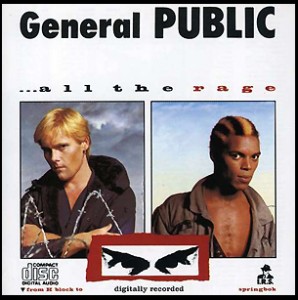
DP: The English Beat is currently a tale of two bands: The English Beat fronted by you here in the States and The Beat that includes two of your original band mates from the early 80’s. How does that work – especially if you want to perform shows or tour in the UK?
DW: Well, it was fine. Now it’s causing enormous trouble. I wish I had never suggested it in the first place. You know, your kindness can come back and bite you in the ass, can’t it? Now it’s difficult for me to find a gig in England because they can’t call me “The Beat” because [Ranking] Roger’s used that name so much and they can’t call me “The English Beat” because they’ll think that everybody will think that’s a cover band covering the Beat’s songs. I find myself with the irony of trying to arrange a song in my hometown and finding it more difficult than I expected! [laughs] It’s the troubles of ska, Dave. I tell you it’s not as easy as it looks, mate! It looks like one knees-up party but – oh no! – the Machiavellian things that go on in the background. [laughs]
DP: So where do you see the future of ska going?
DW: I think it’s got a rosy future. It’s always been a music of happy protest and I think there’s going to be much of a taste for that in the upcoming months and year. We found during the punk times or during the 90’s that if you protest too much, it starts to sound like whining and you actually wind up distancing yourself more from the people that you want to reach. Ska – and reggae I suppose – has always had that ability to sound like a party from a distance and then as you dig into the lyrics, you hear that there singing about starving children but it’s acceptable because it’s been put to you in such a delicious way with the beat and it hits your spirit way before it tries to stretch your mind. I think we’re going to start to see a lot of that especially as there aren’t really a lot of record companies that are telling artists “don’t do this” or “don’t do that” to try to modify them for the charts. I think you’re going to see a lot more people just singing straight from their heart and straight into the computer. I dare say there will be a renaissance. I don’t know what wave of ska we’re on now. I think maybe the fifth wave is about to come, I’m not sure. But I imagine that we shall see one and I’ll be there trying to flagrantly take best advantage of it as soon as it happens you can be rest assured of that! [laughs]
DP: In addition to being a fan of your music, I’ve always been a fan of UB40, a band that started in Birmingham and got together the same year that the Beat did, 1978. Why do you think was there such a massive ska and reggae movement in your hometown?
DW: The guys in UB40 and I grew up within a mile of one another as kids. It’s remarkable. There were also the Selector and the Specials in Coventry and Dexy’s Midnight Runners in Birmingham at the same time. I think more than anything else it was a post-punk reaction where punk hadn’t really been a huge deal in Birmingham. Most of the people who had made any name of it in that genre had gone off to London to do it, as is traditional in Birmingham. But immediately post-punk, for reasons I’ve never really fully understood, a terrific scene 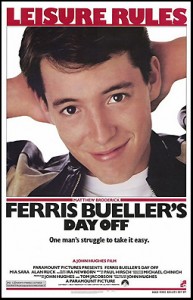 developed that we weren’t even aware of, frankly, because who was to know that UB40 was going to become the biggest-selling reggae band in the world or that Dexy’s Midnight Runners were going to be lauded as poets for decades? Nobody had that idea of that at the time, really. We were just three local pub bands trying to be sarcastic about each other behind each other’s backs! [laughs]
developed that we weren’t even aware of, frankly, because who was to know that UB40 was going to become the biggest-selling reggae band in the world or that Dexy’s Midnight Runners were going to be lauded as poets for decades? Nobody had that idea of that at the time, really. We were just three local pub bands trying to be sarcastic about each other behind each other’s backs! [laughs]
DP: Your song “March of the Swivelheads”, an instrumental version that you released of “Rotating Head”, was used extremely effectively in the ending chase sequence in “Ferris Bueller’s Day Off”.
DW: It was, wasn’t it?
DP: Definitely. And it’s probably the song that’s most associated with the movie – with the possible exception of Yello’s “Oh Yeah”. Yet, despite the degree to which music was at the core of the movie and how successful the film was at the box office, no soundtrack album was ever released. Do you know why this was the case?
DW: I never really fully understood why. I think what was happening at that time was that John Hughes was starting to develop his own company, John Hughes Music, and all of a sudden trying to license tracks three ways rather than two became thoroughly complicated. I think that was what happened because we were fully anticipating a soundtrack at the time and, of course, it was going to be a fairly great one.
DP: And probably a big seller, too based on the fact that soundtrack albums to his movies usually moved lots of copies because kids dug the music and, in order to relive the movie experience, bought the soundtrack album or cassette given that, at the time, you couldn’t go out and buy a videotape of the film or download it. I know a lot of soundtracks from John Hughes movies wound up in my record collection for that very reason.
DW: Right. You know, they’re making a documentary about that film now. I’ve been invited to speak on the DVD of that documentary but I haven’t really decided yet. I’m not really sure, to be honest.
DP: While we’re on the topic of soundtracks and collections of songs by various artists, if I snagged you iPod, turned it on and pressed “random”, what would I hear?
DW: Well, you’d be very lucky if you managed to snag my iPod, because I don’t have one and I never will. I don’t think they sound any good. My son, a few years ago, came running up all disappointed like “Oh, dad! My iPod’s broken!” And I said “Good!” [laughs] You know, the instruments in a classical orchestra were effectively designed around human’s emotional points – chakras is what I call them – and analog recording was designed around those same parameters. But when you switch the whole thing to digital, one of the things that happens is that the instruments don’t resonate at the same places they used to. So the old people who say the “album” vinyl version of Led Zeppelin I sounds warmer than when they listen to it on their iPods are absolutely correct.
DP: I noticed that on the English Beat’s facebook page that you had posted a picture of your hallmark teardrop-shaped guitar that had made it into the Rock and Roll Hall of Fame. How did that come to happen?
DW: Yes, I just put the photographs of it up yesterday on my facebook as well as that, recently in my hometown local newspaper, the Birmingham Evening Mail, printed out what they thought were their all-time top 10 bands to come out of Birmingham and we came fifth after Black Sabbath, the Moody Blues, Duran Duran and ELO. So to be able to post both of those things in the same week was stunning to me. I first met the people associated with the Hall of Fame when we opened for Devo in Cleveland and they started coming to a few shows. They gave us a tour of the museum and we got to go back behind the scenes. You have to have a coat on and a pair of gloves sort of like a doctor to go back in this spot. You’re not allowed to touch anything. We saw one of Bob Marley’s dreadlocks in a box 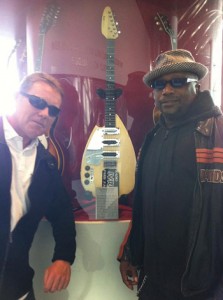 covered in paper tissue. They opened another box and there was a longish envelope that had been slit open and on the inside in John Lennon’s handwriting was an early draft of “Lucy in the Sky With Diamonds” with all of these crossings-out and changes. You could see where he was playing with the words and the rhymes. Absolutely stunning. I had a fantastic time. I got to meet the guy that runs it and it turned out that in 1980 he’d been a college radio guy in Ann Arbor and, unbeknownst to me, I’d been his first interview ever on the air and I was really kind to him, I guess and helped him through and now he’s the head honcho at the Rock and Roll Hall of Fame! [laughs] So on my way out, they asked me if I enjoyed myself and I said that it was fantastic. The only placed that had ever moved me more, really, was the Motown Museum I have to visit every time I go to Detroit. So they said, “OK…well when do we get your guitar?” and I was like “WHAT?!?” [laughs] It was sad though, to be honest, because I played that particular guitar at every gig for 27 years. So it came the morning to hand it in and I had a little play on it in the hotel room, talked to it a bit and shed a couple of tears. They fell on the guitar so I polished the guitar with tears, put it in the box and took it in. I still feel kind of guilty because I know it doesn’t know what’s going on. It thinks it’s just waiting between the sound check and the gig, you know? “No, no…Dave will be here in a minute. Long break before the show tonight isn’t it?” [laughs] So I have to talk to it whenever I go back and look at it in the case and try to explain the situation, but then I start gathering crowds of tourists looking at me. “Oh look, daddy! That old man is talking to a guitar!” I’ll have to stop, let the crowd disburse and then go back and have another chat.
covered in paper tissue. They opened another box and there was a longish envelope that had been slit open and on the inside in John Lennon’s handwriting was an early draft of “Lucy in the Sky With Diamonds” with all of these crossings-out and changes. You could see where he was playing with the words and the rhymes. Absolutely stunning. I had a fantastic time. I got to meet the guy that runs it and it turned out that in 1980 he’d been a college radio guy in Ann Arbor and, unbeknownst to me, I’d been his first interview ever on the air and I was really kind to him, I guess and helped him through and now he’s the head honcho at the Rock and Roll Hall of Fame! [laughs] So on my way out, they asked me if I enjoyed myself and I said that it was fantastic. The only placed that had ever moved me more, really, was the Motown Museum I have to visit every time I go to Detroit. So they said, “OK…well when do we get your guitar?” and I was like “WHAT?!?” [laughs] It was sad though, to be honest, because I played that particular guitar at every gig for 27 years. So it came the morning to hand it in and I had a little play on it in the hotel room, talked to it a bit and shed a couple of tears. They fell on the guitar so I polished the guitar with tears, put it in the box and took it in. I still feel kind of guilty because I know it doesn’t know what’s going on. It thinks it’s just waiting between the sound check and the gig, you know? “No, no…Dave will be here in a minute. Long break before the show tonight isn’t it?” [laughs] So I have to talk to it whenever I go back and look at it in the case and try to explain the situation, but then I start gathering crowds of tourists looking at me. “Oh look, daddy! That old man is talking to a guitar!” I’ll have to stop, let the crowd disburse and then go back and have another chat.
DP: So if the Hall of Fame gets broken into and that guitar is the only thing missing as a result, I think I’ll be able to tell the authorities who their main suspect should be, right?
DW:Yeah! Either that or it probably walked and came back! [laughs] One day, I may have to use it at a show in Cleveland. The paperwork is extensive because it’s now not a musical instrument. It’s insured as an artifact. In fact, nobody’s allowed to touch it without white gloves – including myself. A lot of people said it sounded like I played it with gloves on anyway, so it’ll all work out! [laughs]
For more information about the English Beat and tour dates visit:
Facebook: http://www.facebook.com/EnglishBeatFans
Twitter: http://twitter.com/#!/englishbeatfans
MySpace: http://www.myspace.com/officialbeatspace
Dave’s official web page: http://www.davewakeling.com/home.asp
